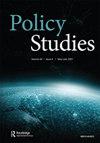Blood is thicker than water: local favouritism and inter-local collaborative governance
IF 2.3
4区 管理学
Q2 PUBLIC ADMINISTRATION
引用次数: 1
Abstract
ABSTRACT Exploring the micro-mechanisms of collaborative governance regarding decision-makers’ behavioural and psychological motivations can advance an understanding of governance in fragmented systems. Among these motivations, local favouritism is a common behaviour that has received little attention in inter-local collaboration. Whether and why local government decision-makers engage in local favouritism in inter-local collaboration remains unanswered. This study incorporates social identity theory into the institutional collective action framework to answer these questions and tests our hypotheses using an empirical case of the impact of provincial leadership turnover on inter-provincial watershed environmental collaboration in China. The results show that decision-makers engage in local favouritism in inter-local collaboration and that the reasons for such behaviour are related to decision-makers’ social identity with their hometowns. The social identity of local decision-makers with their hometowns enhances the utility they obtain when engaging in collaboration. This increased individual utility raises the perceived benefits of collaboration and makes decision-makers more likely to collaborate with their hometown jurisdictions.血浓于水:地方偏袒和地方间合作治理
从决策者的行为和心理动机出发,探索协同治理的微观机制,有助于我们更好地理解碎片化系统中的治理。在这些动机中,地方偏袒是一种常见的行为,但在地方间合作中很少受到关注。地方政府决策者是否以及为什么会在地方间合作中偏袒地方仍然没有答案。本研究将社会认同理论纳入制度性集体行动框架来回答这些问题,并使用省级领导更替对中国省际流域环境合作影响的实证案例来检验我们的假设。研究结果表明,决策者在地方间合作中存在地方偏好行为,其原因与决策者对家乡的社会认同有关。地方决策者与家乡的社会认同增强了他们在合作中获得的效用。这种增加的个人效用提高了合作的感知效益,并使决策者更有可能与他们家乡的司法管辖区合作。
本文章由计算机程序翻译,如有差异,请以英文原文为准。
求助全文
约1分钟内获得全文
求助全文
来源期刊

Policy Studies
PUBLIC ADMINISTRATION-
CiteScore
5.40
自引率
4.50%
发文量
34
期刊介绍:
These changes at the structural level of the global system have impacted upon the work of public organizations either directly or indirectly and have broadened the field of action in policy studies. It has five main areas of intellectual interest: 1.To broaden the lens of policy analysis through the publication of research which locates policy-making within a theoretical, historical or comparative perspective. 2.To widen the field of enquiry in policy analysis through the publication of research that examines policy issues in a British, comparative, international or global context. 3.To promote constructive debate on theoretical, methodological and empirical issues in policy analysis.
 求助内容:
求助内容: 应助结果提醒方式:
应助结果提醒方式:


